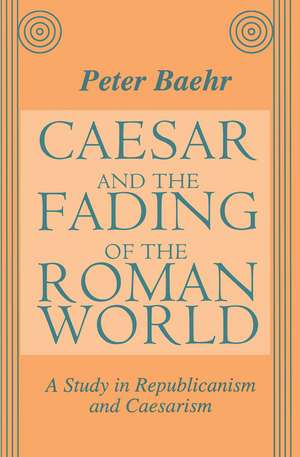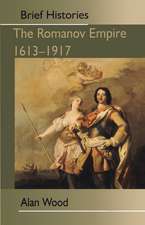Caesar and the Fading of the Roman World: A Study in Republicanism and Caesarism
Editat de Peter Baehren Limba Engleză Paperback – 29 ian 2018
Critical of hereditary monarchy and emphasizing the collective political obligations citizens owed to their city or commonwealth, republican thinkers sought to cultivate institutions and mores best adapted to self-governing liberty. The republican idiom became an integral element in the discourse of the American revolutionaries and constitution builders during the eighteenth century, and of their counterparts in France.
In the nineteenth century, Caesar enjoyed a major rehabilitation; from being a pariah, he was elevated in the writings of people like Byron, De Quincey, Mommsen, Froude, and Nietzsche to the greatest statesman of his age. Simultaneously, Caesar's name continued to function as a term of polemic in the emergence of a new debate on what came to be called "Caesarism." While the metamorphosis of Caesar's reputation is studied here as a process in its own right, it is also meant to highlight the increasing enfeeblement of the republican tradition. The transformation of Caesar's image is a sure sign of changes within the wider present-day political culture and evidence of the emergence of new problems and challenges.
Drawing on history, political theory, and sociology, Caesar and the Fading of the Roman World uses the image of Caesar as a way of interpreting broader political and cultural tendencies. Peter Baehr discusses the significance of living not in a postmodern society, but in a postclassical one in which ideas of political obligation have become increasingly emaciated and in which the theoretical resources for the care of our public world have become correspondingly scarce. This volume is an important study that will be of value to sociologists, political theorists, and historians.
| Toate formatele și edițiile | Preț | Express |
|---|---|---|
| Paperback (1) | 489.26 lei 6-8 săpt. | |
| Taylor & Francis – 29 ian 2018 | 489.26 lei 6-8 săpt. | |
| Hardback (1) | 1012.14 lei 6-8 săpt. | |
| Taylor & Francis – 30 iun 1997 | 1012.14 lei 6-8 săpt. |
Preț: 489.26 lei
Nou
Puncte Express: 734
Preț estimativ în valută:
93.62€ • 97.75$ • 77.31£
93.62€ • 97.75$ • 77.31£
Carte tipărită la comandă
Livrare economică 15-29 aprilie
Preluare comenzi: 021 569.72.76
Specificații
ISBN-13: 9781138507852
ISBN-10: 1138507857
Pagini: 368
Dimensiuni: 152 x 229 x 19 mm
Greutate: 0.45 kg
Ediția:1
Editura: Taylor & Francis
Colecția Routledge
Locul publicării:Oxford, United Kingdom
ISBN-10: 1138507857
Pagini: 368
Dimensiuni: 152 x 229 x 19 mm
Greutate: 0.45 kg
Ediția:1
Editura: Taylor & Francis
Colecția Routledge
Locul publicării:Oxford, United Kingdom
Cuprins
Introduction; 1: Caesar Within the Republican Imagination; 2: The Advent of Caesarism; 3: Bismarck and the Crisis of German Politics: Max Weber and His Contemporaries I; 4: From German Politics to Universal Sociology: Max Weber and His Contemporaries II; 5: Caesarism in Twentieth-Century Political and Sociological Thought
Descriere
Two new criminological approaches are defined and applied to categories of crime in Routine Activity and Rational Choice, now available in paperback. Routine activity analyzes the criminal event, and avoids motivations and psychology as topics for discussion, whereas rational choice approaches crime as purposive behavior designed to meet the offender's commonplace needs, such as money, status, sex, and excitement. These conceptual models are both employed to analyze such crimes as drunk driving, gun use, kidnapping, and political violence. This volume discusses the relationship of these theories to more traditional approaches to crime studies.The Advances in Criminological Theory series encourages theory construction and validation in the articles and themes selected for publication. It also furthers the free exchange of ideas, propositions, and postulates. Following publication of the first volume, Michael J. Lynch of Florida State University asserted that "Advances in Criminological Theory is to be applauded as an attempt to revive criminological theory by providing an accessible outlet." Contributions to this volume include: Pierre Tremblay, "Searching for Suitable Co-offenders"; Raymond Paternoster and Sally Simpson, "A Rational Choice Theory of Corporate Crime"; Richard B. Felson, "Predatory and Dispute-related Violence"; Gordon Trasler, "Conscience, Opportunity, Rational Choice, and Crime"; Ezzat A. Fattah, "The Rational Choice/Opportunity Perspectives as a Vehicle for Integrating Criminological and Victimological Theories"; Patricia L. Brantingham and Paul J. Brantingham, "Environment, Routine, and Situation"; Maurice Cusson, "A Strategic Analysis of Crime"; Richard W. Harding, "Gun Use in Crime, Rational Choice, and Social Learning Theory."





